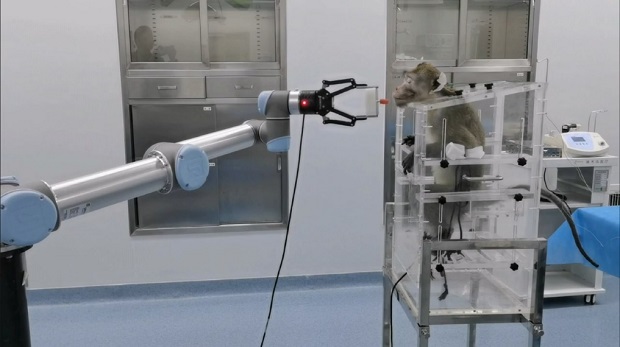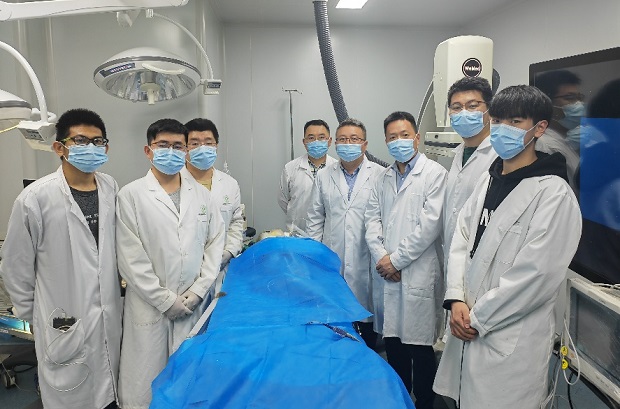
First time in history, a monkey's brain was connected to a computer: the animal was able to control the robotic arm (photo)
For the first time in the world, Chinese scientists have connected a brain-computer interface (BCI) to the brain of a non-human monkey. As a result of the experiment, the animal was able to control the robotic arm. Previously, similar experiments were conducted on sheep.
The experiment was carried out by the scientists of Nankai University, led by Professor Duan Feng, in cooperation with the specialists of the Chinese People's Liberation Army Hospital and the medical company Shanghai HeartCare Medical Technology Co.
Scientists resorted to minimal invasive surgery: without trepanation of the monkey's skull, the sensors were moved through the cerebral vessels and sagittal sinus to the motor cortex. This made it possible to detect and collect electroencephalogram (EEG) signals, thanks to which the animal was able to actively control the robotic arm.

The American company Neuralink, owned by Elon Musk, is also working on creating a BCI. However, it uses an invasive method, while the technology used by Chinese scientists does not require trepanation of the skull, is less traumatic and safer for the patient.
The BCI, along with invasive and non-invasive, is one of the top three technologies in the life sciences segment currently in research and experimentation stage. The interventional BCI, through which it is possible to connect the brain to a computer with minimal surgical intervention, is less harmful than invasive technology and at the same time it provides a better quality of EEG recording than non-invasive technology.
Compared with traditional invasive and non-invasive BCI, interventional BCI combines the stability and safety of signal recognition, said Duan Feng (pictured fourth from right) in an interview with Xinhua News Agency.

“Completing trials on animals is a ground-breaking progress, and a step from zero to one. But there's still a long way to go, as [developing technology] for clinical application is a prolonged process from one to 100,” Ma Yongjie,a neurosurgeon at the Xuanwu Hospital, who also participated in the experiment, told Beijing Daily.
- Most read
month
week
day
- Xiaomi unveils exclusive Redmi Note 13 Pro+ dedicated to Messi and Argentina national team 917
- Sparkles: Boston Dynamics unveils a furry robot dog that can dance (video) 849
- Internet 500 times faster than 5G tested in Japan: It allows to transfer five movies in HD resolution in one second 763
- Is there a ninth planet in the solar system? Scientists find new evidence 724
- What will happen to the Earth if the Moon disappears? 717
- iPhone 16 may get colored matte glass back panel, 7 colors 694
- Which smartphones will be the first to receive Android 15? 678
- Great value for money: 3 best Realme smartphones 670
- WhatsApp receives two new features 616
- How do hackers use public Wi-Fi hotspots to intercept data and how to protect yourself from them? 593
- Archive
